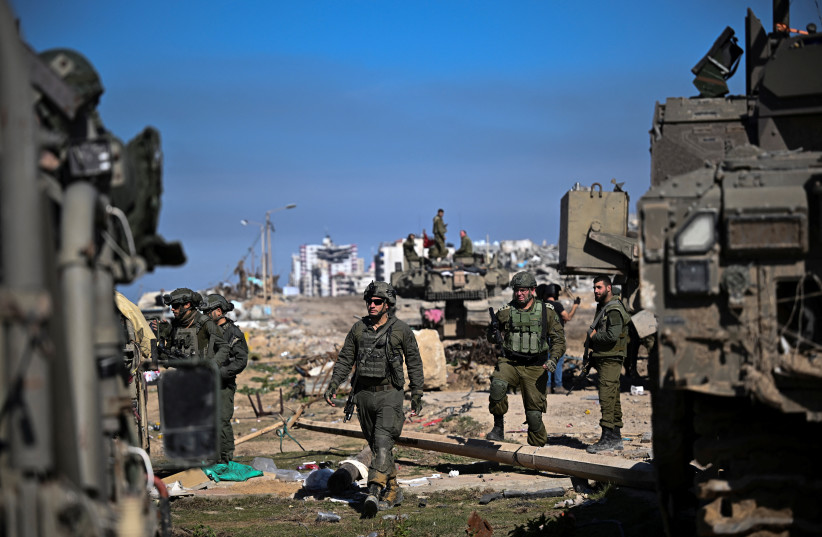The IDF plans to produce an interim report of sorts on its alleged war crimes probes of its soldiers in late March-early April, The Jerusalem Post has learned. The decision to produce such an interim report was split into two stages.
At the first stage earlier in January, as the hearing on genocide before the International Court of Justice unfolded, top IDF legal officials decided it was important to map out the status of the operational probes relating to alleged war crimes. Part of this process included vetting the files for cases that involved higher numbers of alleged civilian casualties or which had received greater media attention, such as incidents in which the IDF allegedly mistakenly killed journalists in Lebanon with no suspected terror ties.
Another part of the process involved categorizing files by how far along the initial probes were as well as how quickly they might be able to be advanced toward arriving at initial decisions or at least in-depth public updates. However, at this stage, this process was only carried out so that top IDF legal officials would have the lay of the land of the IDF’s and Israel’s potential exposure and of how quickly some kind of an interim report might be rolled out, should the need arise.
Uncertainty with the ICJ
The IDF legal division and Israel still did not know how the ICJ would rule, and it was thought prudent to be prepared with additional information should any quick additional action be required once the ICJ issued its decision. On January 26, the ICJ on the one hand declined to order the IDF to cease the war or to withdraw from Gaza, but on the other hand, issued a series of warnings to Israel about the implications of its conduct of the war and ordered an update be delivered to the court around February 26.
Shortly after that decision, the IDF legal division decided to proceed with the interim report. The idea and purpose of the interim report will be to provide initial review decisions or in-depth updates on some portions of the dozens of high-profile cases that are being given priority to arrive at results much sooner than the wider massive number of files.

Part of the problem is that if after the 2014 Gaza conflict, the IDF performed 500 initial probes and 32 full criminal probes, the scope of the current war so dwarfs that conflict, that the IDF is expected to have to perform many thousands or more initial reviews to decide how many criminal probes are necessary. While some IDF probes from 2014 had initial results within weeks or months of the end of the 50-day war, some took as long as four years.
TAKING INTO account the much larger number of initial reviews that will need to be performed this time, the IDF has increased its staff dedicated to the task. However, even with increased staff, the IDF legal division understood that it could not delay reporting to the ICJ and allies like the US beyond a certain point.
Moving forward with an interim report on select high-profile cases was a move designed to address concerns about progress and transparency in war crimes probes. If the initial decision were made with the ICJ in mind, this decision took on new significance after the US announcement last week that Israel would have 45 days, until around March 23, to file a report on its war crimes probes and compliance with international law, should it want US arms to continue to flow to it.
Whatever the IDF legal division may produce in late March or April, there will probably be a fuller, but still express interim report some months later, before a large number of the cases reach decisions at the initial level. All this may only be at the initial review level, which leads to a recommendation by top operational commanders to IDF Military Advocate General (MAG) Maj.-Gen. Yifat Tomer-Yerushalmi about whether to open a fuller criminal probe.
Tomer-Yerushalmi can then take longer to analyze the legal issues involved and instruct the IDF investigators to gather supplemental evidence. There may also be a small number of cases where the suspicion against the soldier was so high that a file immediately moved into being a criminal probe.
For the early months of the war, the IDF legal division and Justice Ministry believed there was no basis to issue even an interim report because too much of the largest stages of the war still had not taken place. They were holding off just trying to keep up with the potential files that had already come in.
Also, despite US and human rights pressure to issue reports sooner, there is heavy domestic pressure against being seen as undermining IDF combat soldiers while many of them are still regularly dying as they try to defeat Hamas and return the Israeli hostages. The IDF legal division says it will follow the Turkel Commission report time lines, but aspects of those time lines are amorphous, and again, some key reports from the 2014 conflict were only produced four years later.
It seems that the upcoming interim reports will only be the opening volley in a years-long struggle of reports that Israel will need to provide to the ICJ, the US, and others.
